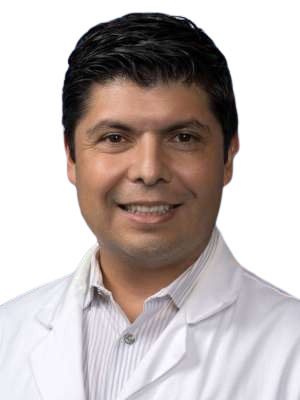Born in 1983 to migrant farm workers in Yuba City, California, Dr. Jesús G. Ulloa’s roots are firmly planted in the values of hard work and family. He and his wife, an ophthalmologist, and his two young children reside in Southern California, ensuring a close connection with other family members.

His educational path began at the local community college and continued through the University of California system, with stops at UC Davis for undergraduate studies, UC Irvine for medical school, UCSF for general surgery training, and UCLA for vascular fellowship.
The culmination of his life experiences continually led him down the path of becoming a vascular surgeon. As a third-year medical student, his first rotation was in vascular surgery, where he was inspired by the attendings' focus on the technical aspects of their cases. To him, vascular surgery was a paradox: on one hand, it was simple—“either the blood gets there or it doesn’t”—yet, on the other hand, understanding the complexities of each patient was enough to captivate him.
Growing up, Ulloa admitted that working on cars with his dad was one of his best experiences in prepping for surgery.
“He would always say, ‘Bring me the thing.’ I had to figure out what he meant and where it was,” he said. “Just that was the only prompt and having to figure out what he needed and make it available. I’ve found myself in similar situations in the operating room where you have to kind of meld with the person you're working with and anticipate their next move and help provide the exposure or help set them up for that stitch.”
Now as chief of vascular surgery at the Greater Los Angeles VA, and assistant clinical professor of health sciences at the David Geffen School of Medicine at UCLA, Ulloa oversees care across a vast catchment area, including telehealth coordination and surgical access for veterans from Bakersfield to the Central Coast. He is deeply committed to resident and fellow education, treating trainees as junior colleagues and guiding them through both complex and routine vascular procedures. He found mentors in Drs. Michael Conte, Linda Reilly, Jessica O’Connell, Hugh Gelabert, and many others, in learning how to follow the suture and set themselves up for the next stitch.
“My mentors were always willing to share their little tidbits on what made them surgeons who were able to work quickly through a case and not get bogged down by the small steps,” said Ulloa.
In his work, he handles dialysis access, lower extremity amputations, revascularizations, and other noteworthy procedures. One case that stood out to him was a 90-year-old monolingual Spanish-speaking woman he treated for tissue loss, whom her two daughters always accompanied. As they were preparing to take her for an angiogram, the daughters were apprehensive. The mother, a stoic 90-year-old, Ulloa said, was the type of person who would do whatever was necessary. During this time, the daughters expressed their trust in his medical team. The mother then said, “Well, let me give you the only thing I know how to give—my blessing.”
“It felt like I was operating on my grandmother,” he said. “There are a lot of parallels in that moment; it reminded me of the power of shared experience and cultural understanding.”
Ulloa emphasizes the importance of representation in medicine. “We serve a very diverse patient population, and the diversity of the workforce reflects that patient population. There's certainly data demonstrating that there are improved outcomes when you have a diverse workforce that can also anticipate the different barriers to care,” he said.
When Ulloa summarizes “Why Vascular,” he stresses mentorship in building those strong connections that propelled him forward.
“These are all vascular surgeons who took an interest in me as a person and in my professional growth and have continued to nurture my growth as a surgeon. That's what vascular surgery does well: we help each other grow clinically and professionally. We help each other get through some complicated cases, some poor outcomes, and grow from those outcomes to then set ourselves up to provide the next patient with the best care possible,” said Ulloa.
When you donate to the SVS Foundation, you support Voices of Vascular's important work in promoting diversity, equity, and inclusion. Learn more and make your gift today.
